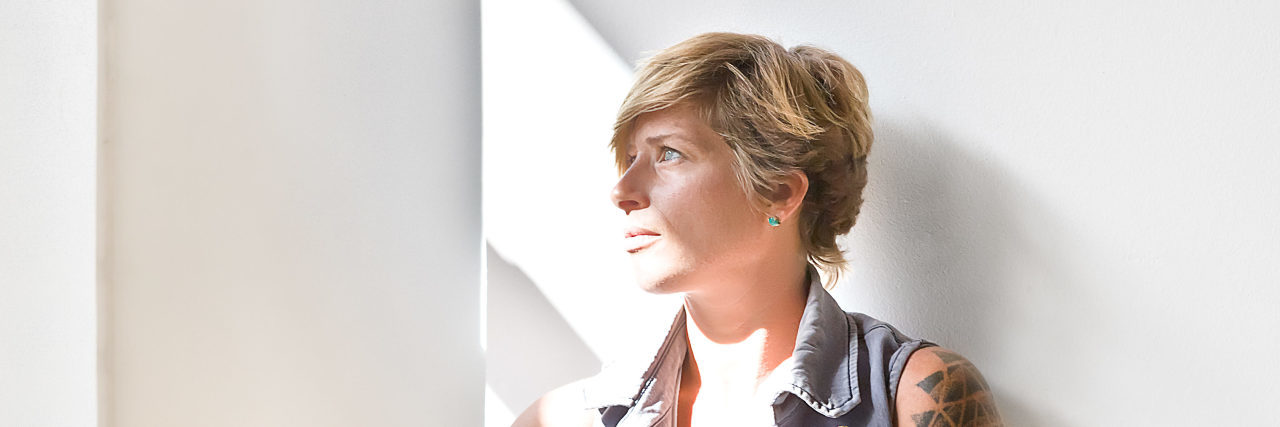When I Experience Guilt Because of Chronic Illness
Editor's Note
Join The Mighty’s Spoonie Life Hacks group to get tips for tackling everyday tasks from people living with chronic illnesses — or to share your own hacks!
“Do you have a lot of guilt with chronic illness?”
I mostly get asked this by other spoonies, others with chronic conditions themselves.
Yes.
This could be the shortest article ever. I could just leave it at that. Yes, I have a lot of guilt with chronic illness. There is guilt on every front. I’m not the kind of wife, auntie, daughter, sister, friend, niece, employee, neighbor, activist, advocate, community-member, or dog-mama I wish I could be. This isn’t the path I was on, isn’t the life I imagined, isn’t the future I pictured. I can load up a guilt weapon and fire it at myself about any number of things large and small, about any of these roles. Here are a few examples.
The trash. Every other week we have trash picked up from our curb. It is a rather slim blue bin that has wheels. It gets taken out with our large green recycling bin. While on a good day I can gather the trash cans from various rooms in our house and take them out to the trash to empty them, the physical act of maneuvering and dragging the bins out to the end of our driveway is like a hike to me. The effort to haul them (one at a time, for me) can land me in bed for an hour or more to recover. To take out the trash. And so, this task falls to my wife almost 100 percent of the time, like so many other tasks around the house large and small. Guilt.
Showing up for my friends. The nature of my illnesses is quite variable. I go through significant changes in my abilities from one day/week/month to the next. There are times when I have been able to be on my phone or devices for more than a month at a time. There are some periods when I “go dark” for several days. That means my friends can reach out and then not hear from me. Yuck! In addition to that, I’m not always able to make or keep plans. I used to pride myself on being reliable and now I feel anything but reliable. This change has been so difficult on my friendships and on my ego. It’s hard to redefine myself and not see this state of being as a character flaw. Being responsive to my friends and showing up for them is one of the many ways I have guilt.
Surviving. OK, this one is heavy, folks. One of my diagnoses is not a chronic illness, it’s a terminal illness. Pulmonary fibrosis typically kills those diagnosed with it within three to five years of diagnosis. There was a time when I was given less than a year to live. While this daunting news was difficult to hear and metabolize, remarkably, I am approaching that predicted “expiration” date. I’ve known others who have not been so lucky.
Naturally, I have the survivor’s guilt that is born of having the gift others do not. However, here’s the unexpected guilt — the guilt over not dying so my wife could start over. That’s right. I feel like if I had died, she could have moved on, wouldn’t have to be in her prime nursing a sick partner, wouldn’t have to be weighed down by my illnesses but could be living a more full and active life with someone else. I feel like a burden even though I know I shouldn’t.
Even as I write this, I’m having some guilt, because I know this shit, this guilt, serves no one. It doesn’t serve the people I’m feeling guilty for and it certainly doesn’t serve me. These are just thoughts and I don’t have to believe everything I think. The trick is noticing when I’m feeling it. No behavior or habit can be changed or transformed until we notice and acknowledge it. So, my quest is to see the guilt when it’s forming. “Hi there, guilt. I know you. You are familiar but you don’t run the show.”
Once I see the guilt and name it, I have some options: 1) I can sit in the discomfort and have some compassion for my experience. 2) I can practice some of my steps to love what is. 3) I can ask why I’m feeling guilty and see if there is any action I can take to counteract or shift the guilt. 4) I can talk about it with someone or write about it, 5) I can do something on my comfort list. There are more options, but these are some of the best ones I have/that I am working with to transform something that doesn’t serve me into something more functional.
What about you? How does guilt manifest for you in illness and what are your strategies for managing it?
Getty image by JR-Stock.

